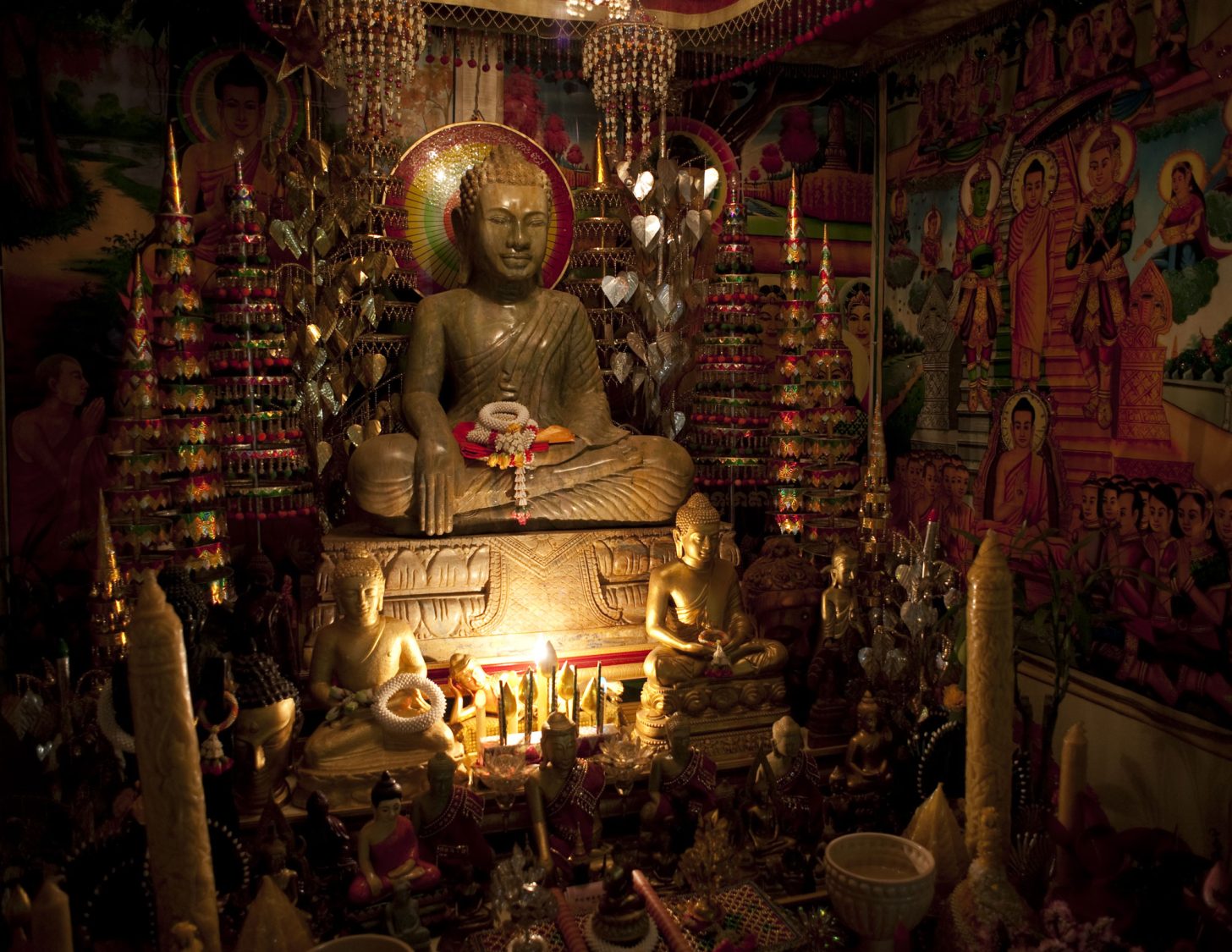Utica, New York, was a factory town when I was born here, famous for corruption and violence, for the vanished Mohawk tribe, for white bread and cheap beer and the Erie Canal. That city’s gone, dying like the rest of the Rust Belt: Utica’s population is down 40 percent. Incomes are less than half the national average. Nearly half the buildings downtown have been torn down.
I left Utica 47 years ago, age 10, and never returned. The day I left, John Kennedy had four months to live. They were advertising a new TV show called The Fugitive. Radios played “Surf City,” “Memphis,” and bad-girl group The Angels promising a “beating” in “My Boyfriend’s Back.” “You’re gonna be sorry you were ever born,” they sneered. “If I were you I’d take a permanent vacation.”
And now, instead of The Angels, devas. Refugees, including Buddhists from war-torn regions in Asia, have arrived in Utica. The monks who led Burma’s “Saffron Revolution” came here, along with Cambodian and Vietnamese exiles. Their presence gave me a reason to return. There was something I didn’t want to face here, some reason I never came back. I’d first engaged with Buddhism as something exotic, another form of escape like many I’d tried. Impermanence, interconnectedness, dukkha (suffering), the nature of self—they had been abstract ideas to me. Maybe seeing this place again and meeting these people would make them more real. For years I’d run away from the frightened kid I’d been. Maybe now I was ready to face this place, and whatever remained of this place in me.
“Sin City USA!” screamed the cover of a 1959 magazine about Utica. “Corrupt Policemen, Racketeers Laughing at The Law … An Empire of Vice and Drugs.” A few years later the town’s prosperity began to fade, until finally even the hit men left for more promising territory. The house where I spent my first few months of life is now boarded up, abandoned like most on the block. Drug deals go down on the street outside. But three blocks away, kindly monks encouraged me to eat an apple and sip a Thai energy drink. “I spent ten years in prison for pro-democracy activities,” said U Pyinya Zawta, Executive Director-in-Exile of the All Burma Monks’ Alliance. “There I suffered the pain of torture.”
The Burmese monks were brought here by the Mohawk Valley Resource Center for Refugees, the hub of a 13,000-person immigrant community that makes up roughly 20 percent of the city’s population. Most of Utica’s 2,000 Burmese are ethnically Karen Christians, along with some Muslim families and two or three hundred Buddhists.
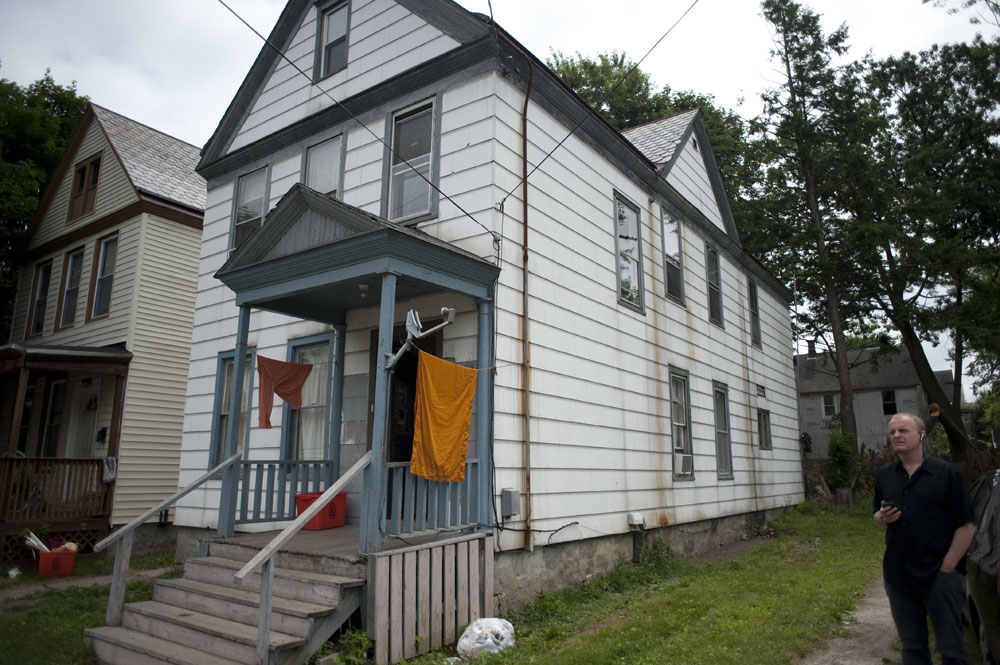
Some Buddhists speak of karmic residue, vasana, as “perfume.” “After you scream,” said Zen teacher Dainin Katagiri, “something is still there … not as a shadow, but as something in your body and mind.” At the age of 8 I was held in our family’s garage for hours by a gang of older kids, stabbed 19 times with a rusty hatpin. U Pyinya offers no specifics about his 10-year ordeal. Instead, he told me how his experience with HIVinfected prisoners led him to build the first HIV facility in Burma.
Peeling paint and crayon scribblings marked the walls of the tiny house he shared with three other monks. I asked him if monasticism and political activism are in conflict. “The Buddha taught us that we need to work for the whole universe,” he answered, “and for all living beings to be peaceful and happy.” Burmese visitors wandered in and out of the house, but activity stopped when the BBC’s Burmese-language news broadcast came on, and the monks huddled around the radio.
“Do you meditate?” U Pyinya Zawta asked me. “You seem like that. Calm.” I thanked him, thinking my wife might disagree. What does he expect now for Burma? “Things will get worse,” he said. “Soldiers are raiding villages, raping and robbing the people there. There will be more poverty. They’ll keep recruiting younger and younger child soldiers. We hear they are recruiting them at 14 and 15 now. Burma was very rich in jade, sapphire, natural gas, tea … but the military doesn’t share it with the people. In a country rich with natural gas, people can’t get electricity more than a couple of days a week.”
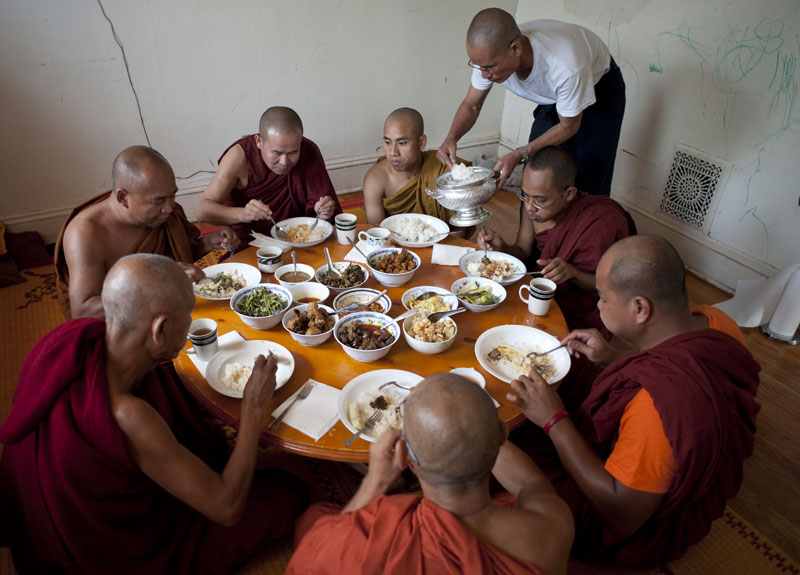
Poppies are a natural resource there, too. Burma reportedly supplies more than half of the U.S.’s heroin. How’s this for interconnectedness? Americans who die from overdoses in cities like Utica are victims of Burma’s generals, too. A question I hesitated to ask: Do they feel their uprising failed? “We’re satisfied that more people know about Burma now. The world community is much more aware of the brutality of the military regime.” He pauses. “We will continue to make people aware of Burma’s problems.”
U Gawsita, the public face of the Saffron Revolution, wandered in and out of the room with what seemed like indifference. Later I heard him say in a taped interview that life in Utica was difficult because he couldn’t understand the language. I asked his fellow monk U Agga how they handled loneliness: “We meditate and pray and develop our lovingkindness. We can’t call or email our families, because the regime controls all communications. If we miss them, we meditate more.”
Utica’s Burmese have adapted their folk traditions, moving their annual Thingyan Water Festival from April to July to accommodate the long winters. The number 9—ko—is considered good fortune in Burmese tradition. Traveling parties of eight sometimes brought along a symbolic “ninth member” for luck, and traditionally nine monks would perform the ritual that dispels restless ghosts.
Those ghosts may have to linger now. All but eight Burmese monks in the U.S. have been forced into lay life, working at meatpacking plants and other blue-collar jobs. In response, the Utica monks have formed the All Burma Monks’ Alliance to build a monastery and publicize Burma’s struggle.
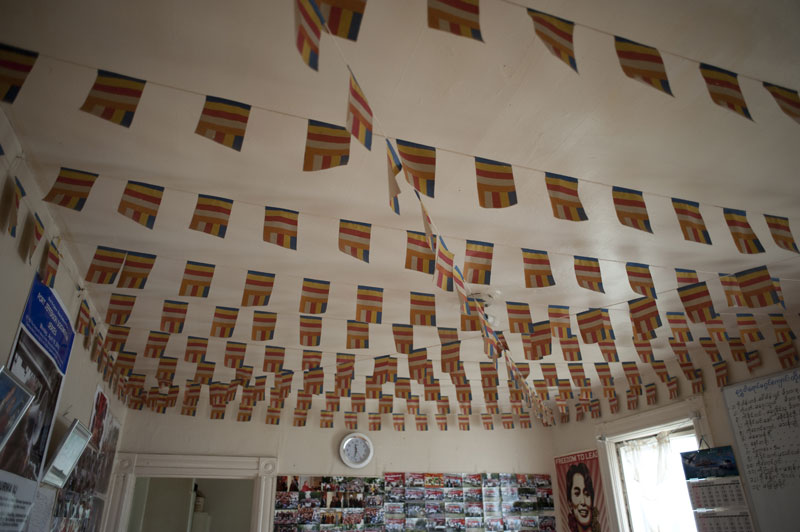
“Young Girls Led Into Lives of Degradation,” The 1959 headlines shouted. “Joy Houses Ran the Gamut from Tawdry to Posh Pleasure Palaces for the Well-Heeled.” I left Utica before puberty, a presexual being as celibate as a monk. The erotic images I saw here were brutal or tawdry: the nude Marilyn Monroe calendar in the gas station, the sordid sex-and-violence covers of Police Gazette and True Detective (“No Mercy for Mary! Pretty Chicago Brunette Loses Her Fight Against a Killer”) in the neighborhood barbershop.
Others have sensed a degraded sexual perfume here, too: “Most corrupt, vial [sic] city in New York state,” one online comment reads. “Hey, remember when the Mayor said Utica doesn’t have $2 hookers, it has $20 hookers?” reads another. Utica has several strip joints but no bookstores.
The city was a “processing hub” for Vietnamese refugees, four or five hundred of whom stayed and built a temple. A photo of their monks’ induction ceremony shows women marching single file down Miller Street, baskets on their heads and children in costumes at their feet. The temple’s erecting a statue of Quan Am, Bodhisattva of Compassion. Perhaps her intercession will help the city’s Amerasians, mixed-race children of U.S. soldiers and Vietnamese mothers, brought here after Congress granted them citizenship. As small children some of them lived on Vietnam’s streets, bearing the poetic-sounding but heartless name bui doi(“dust of life”). Some, their fathers unknown, say they don’t know their true names. Others wonder where they’re “from.”
The night I returned, I found a pharmacy in an unfamiliar industrial area. Inside, loudspeakers played only the oldies of my childhood. I remembered an old Twilight Zone episode: a man returns to the poor neighborhood where bullies once tormented him, only to become a trapped child again. I wondered how far we were from my old home and keyed the address into my iPhone: “Driving time: One minute.”
The pharmacy was built on the site of a White Tower burger joint. The ice cream parlor had been replaced by a body shop. They’d torn down the Pontiac dealership where a salesman once lifted a tarp to show me the taillights on the new Bonneville—a “company secret”—and then said, “Son, promise me you’ll never sell cars for a living.”
Walking toward our old home, I saw a friend’s house, where his drunken mother once said, “Shut up or I’ll smash your lips.” I passed the corner where kids from another block threw rocks at me just for the hell of it. In contrast to the now-abandoned house my parents brought me home to after I was born, the gray-and-white house we moved into a few months later was well maintained. The garage was gone.
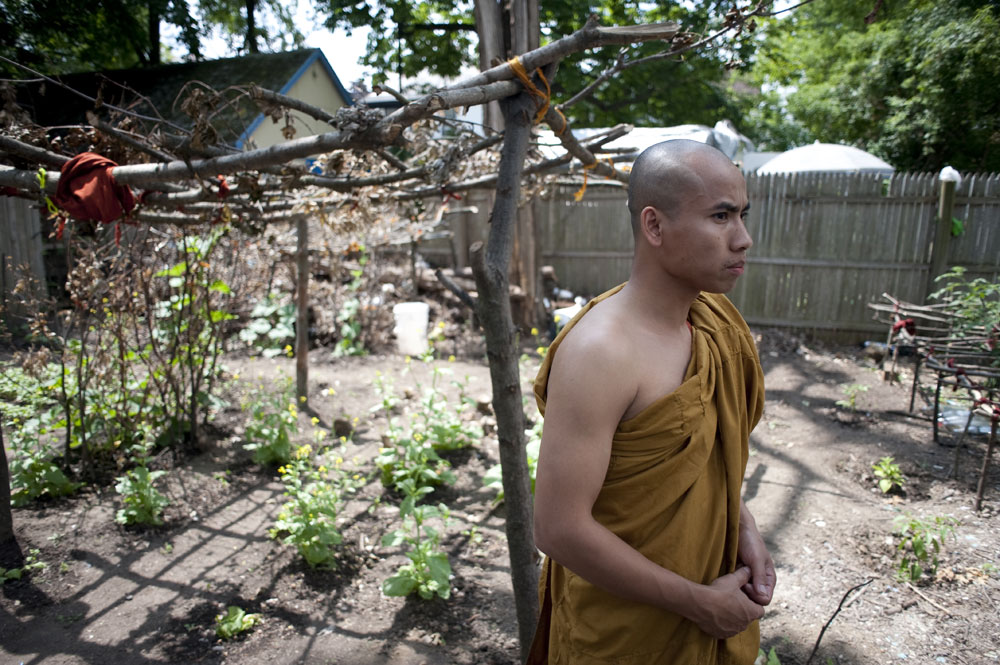
My earliest memory: I’m sitting on the floor of this house, playing with blocks as the babysitter leaves. I can still see her clearly, smiling as she kneels down to spell my nickname with the blocks. I see that too, red letters on cream-colored blocks: “R-I-C-K-Y.” Some might say her act bound me to my identity, my ego, samsara. But she showed me what words are. She gave me my name. I miss her.
A transistor radio upstairs once played a saxophone instrumental called “Stranger on the Shore,” making me sad in a way I wanted to feel over and over. Outside, when I was four, a factory whistle sounded in the distance and the sky seemed to turn gold. I felt completely alone in the universe. I tried to find that feeling again for a long time.
I set off for my school, John F. Hughes, a third of a mile away, and found I still knew every turn of a walk I hadn’t taken for nearly half a century. Approaching the building, I remembered something I’d heard decades later in a support group for alcoholics and addicts: “The minute I walked into kindergarten, I needed a goddamned drink.”
The Thai teacher Ajahn Chah once spoke about dukkha and rebirth, using the Utica-friendly metaphor of a boxer who only ducks after his teeth have been knocked out. “You have to duck before they slug you,” he said. Dukkha is usually translated as “suffering,” but some say it means “craving” or even “addiction.” Ajahn Chah said, “Dukkha sticks on the skin and goes into the flesh.”
Happy memories return, too: Oneida Avenue, at the hill’s summit, limning the farthest reaches of my childhood. The cemetery, with knobbed stone gates like a troll’s gateway. Train tracks, now gone, where I’d look down the line and imagine I was seeing California.
The barbershop’s gone. In 1962, I was getting a haircut there when an air-raid drill sounded. It was illegal to be outside during a drill, but the barber sprayed me with hair tonic to drive me away. “Get the fuck outta here,” he said. Reeking of Vitalis, I walked home through deserted streets as sirens wailed. Now I cut through the same vacant lots, behind the same brick buildings, which today also stood vacant. Two bikers drank beer on their porch, motorcycles gleaming at the curb. On my block an old woman watched me suspiciously until I introduced myself. Everyone you knew is gone, she said, listing one family name after another. Dead, or moved to New Hartford, a nicer town up the road.
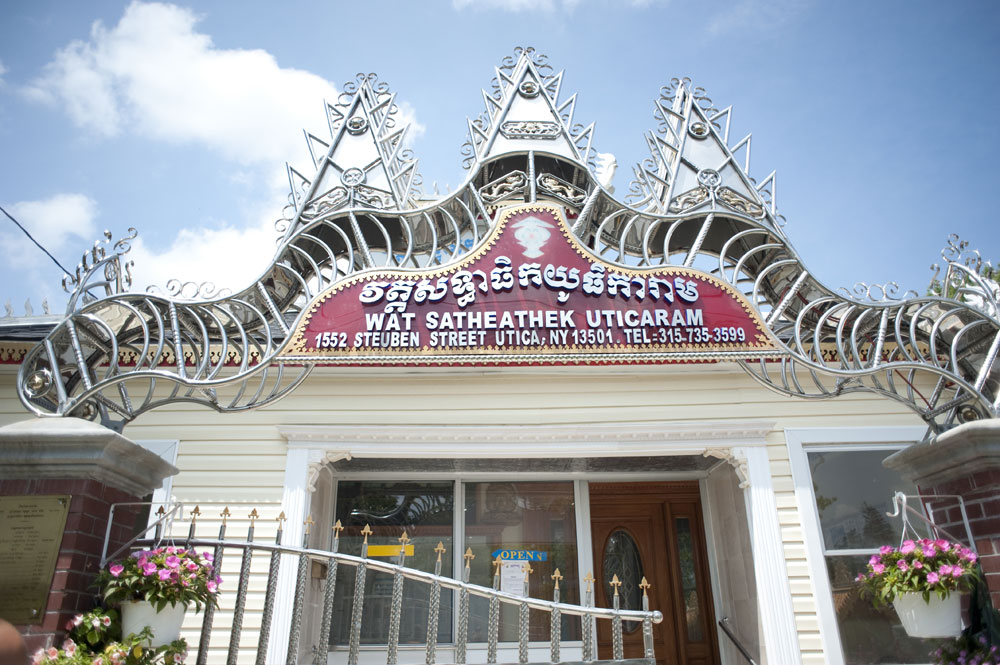
A small boy stared at me. He was dark-skinned, something unimaginable on this street in my segregated childhood. My Utica’s as ancient for him as the Wright Brothers were for me. There’s a picture of me using my cell phone outside the monks’ house. It shows a man in black clothes of no known 1950s fashion. A headset flashes in his ear. The object in his hand links him to the entire world. He’s an emissary from my childhood’s future visiting refugees from its agrarian past.The next day I joined the monks for lunch. As Burmese women served food and shared the meal, two refugee children lingered outside. Where do you guys go to school? “Hughes.” Me too, I said—50 years ago. They laughed. It is funny, though I once longed for adulthood and escape from its playground. How do they like Hughes? An American answer: “It’s okay.”
U Agga described a shootout outside their front door last winter. “Bang! Bang!” he says. “Two bodies. Many police came, with flashing lights. Scary.” These monks faced down an entire army, but nothing prepared them for a shootout in the darkness and blood in the dirty white snow. Outside the house was a garden, its fence and gate made of woven branches in the traditional way. Once I had a garden in Utica, too, with carrots and morning glories. I could never wake up early enough to see the flowers’ blossoms, which only appear at daybreak. Finally my father carried me outside to look at them. I only saw them that one time, but they were beautiful.
From the monks’ garden I saw this on the street outside: An African woman in hijab trailed by two burly teenagers, watched by blond kids inside a house draped with a giant American flag. Villagers from Vietnam and Cambodia passing each other in the midday sun. A fat, shirtless, ponytailed white man driving down the center of the street on a tractor, pulling a trailer filled with junk.
A tattooed Burmese man sees our rental car. “Where are you from?” he asks. “I’m from here,” I say. The words feel alien in my mouth. He rolls up his T-shirt for the photographer, a cigarette dangling from his lip like James Dean. His tattoo shows a dove flying over a “Mother Hen,” which either represents his mother country or the entire world. It’s not clear which. “Peace for the people,” he says.
Utica’s Cambodian temple is a few short blocks away. The 75 families who built it wrote their wishes on pieces of paper that are buried beneath its cornerstone. A beaming monk lets us in. An old man in his undershorts is watching TV in the kitchen, but he slips away as we enter. A researcher found that many Cambodian refugees watching American television thought that the special effects were real. “We used to see that same kind of spirit in Cambodia, shooting through the air at night,” one said of a ghostly fireball. “You have them here, too … I’ve seen them in back of the apartment building.”
A Cambodian-American whose name sounds like “Phil” wears a sparkly T-shirt and jeans and speaks at a street vendor’s clip. He shows us the altar, rich with offerings. Shrines outside face the eight directions. The eaves are draped with Christmas tree lights. Admiring the temple’s fine woodwork, I’m told the refugees did it themselves. The sign over the gate reads “Wat Satheatak Uticaram.” I know that wat means “temple” and the last word means “of Utica.” Is that other word Pali, I ask? “You know a lot,” says Phil. After conferring, they translate Satheatak as “opening of the heart.”
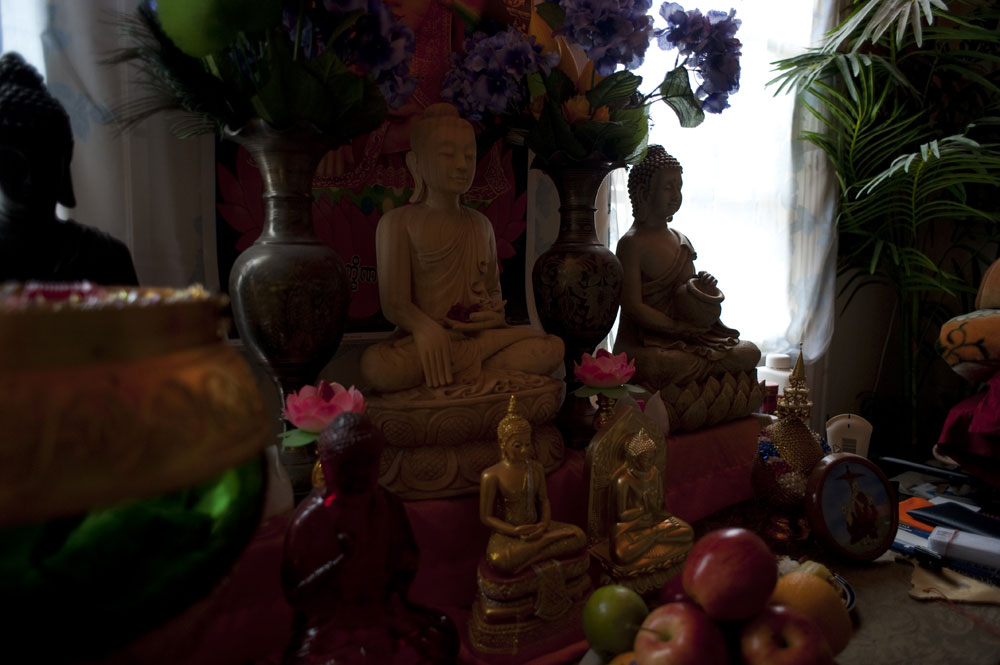
The house next door’s for sale, and the monk wants the community to buy it. Phil thinks people are afraid to sleep near a temple. “Ghosts?” I ask. “I knew you know a lot!” Phil says, but the monk shakes his head in disagreement. Tradition says the fiercest khmoc—ghosts—are the spirits of people who died violent deaths. These refugees, survivors of the killing fields, know about ghosts. I leave an offering at the altar.
At dusk I stumble upon the hospital where I was born, framed in the sunset like a B-movie image. A giant banner is draped across it: “The Birthplace.” It reminds me of the Philip K. Dick novel in which the protagonist finds the landmarks in his life replaced with signs bearing their names. But the hospital’s just advertising its new maternity ward. I was a newborn infant once, right here, tiny and speechless. That idea has never felt real to me before.
The Air Force base whose B-52s once flew over our house is closed. Sometimes I’d look up to make sure the bomber overhead was “one of ours.” During the Cuban Missile Crisis I dreamed an H-bomb exploded. No fire or noise, just the world turning yellowish-brown and crumbling away like old parchment. But Utica’s still here, fighting to reinvent itself. There are signs of attempted renewal: microbreweries, a still-thriving museum, a playhouse. There’s even a haunted house in an abandoned factory called “Horror Realm,” where make-believe ghouls enact freakish industrial experiments for paying visitors. Our childhood nightmares have become a tourist attraction.
I found myself straining to hear the soft-spoken monks. The gates of the senses, first opened here, have begun the long process of closing forever. My city’s gone. The child who lived here is not the same person as the man I am. But there’s a connection, an unbroken current. Utica will continue. Or it will die, and something else will take its place. Utica’s Buddhists seem intent on staying. But the Mohawks, whose empire vanished centuries ago, probably thought they were staying, too. So did the families on my block. Two weeks after my visit, I learned that the Burmese monks had unexpectedly left town.
As I drive away, I see they haven’t torn up the old trolley tracks in some older neighborhoods. The sign outside the Catholic Church, “Fish Fry or Pirogyis Every Friday,” could’ve been there 50 years ago. The Cambodian kids in the takeout restaurant might have been the Irish or Italian or Polish teenagers of my childhood, as the girl behind the counter licks the overflow from a takeout cup and apologizes shyly, “It’s for my boyfriend.”
Most stories here won’t be told, but then most stories never are. Angels become lovers. Memories fade, and other people create new ones. One person’s Horror Realm becomes another person’s refuge. Ghosts aren’t real, or if they’re real, then they too melt away. Stories can be rewritten. You can decide for yourself where you’re from.
I’m from here.
Thank you for subscribing to Tricycle! As a nonprofit, we depend on readers like you to keep Buddhist teachings and practices widely available.
